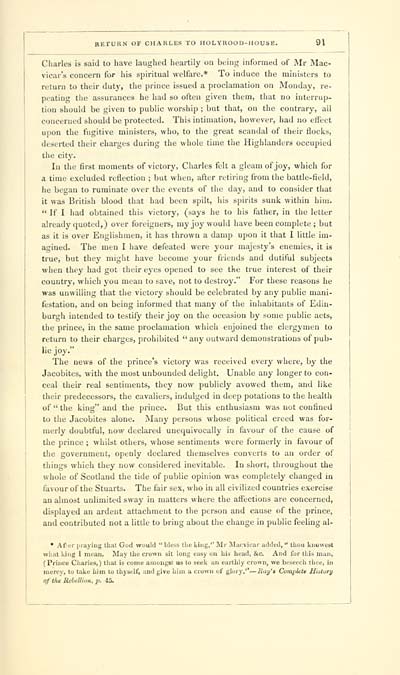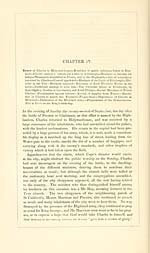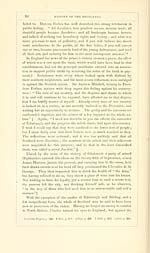Download files
Complete book:
Individual page:
Thumbnail gallery: Grid view | List view

RETURN OF CHARLES TO HOLYROOD-HOUSB. 91
Charles is said to have laughed heartily on being informed of Mr Mac-
vicar's concern for his spiritual welfare.* To induce the ministers to
return to their dutj', the prince issued a proclamation on Monday, re-
peating tlie assurances he had so often given them, that no interrup-
tion should be given to public worship ; but that, on the contrary, all
concerned should be protected. This intimation, however, had no eftect
upon the fugitive ministers, who, to the great scandal of their flocks,
deserted their charges during the whole time the Highlanders occupied
the citj'.
In the first moments of victory, Charles felt a gleam of joy, which for
a time excluded reflection ; but when, after retiring from the battle-field,
he began to ruminate over the events of the day, and to consider that
it was British blood that had been spilt, his spirits sunk within him.
" If I had obtained this victory, (says he to his father, in the letter
already quoted,) over foreigners, my joy would have been complete ; but
as it is over Englishmen, it has thrown a damp upon it that I little im-
agined. The men I have defeated were your majesty's enemies, it is
true, but they might have become your friends and dutiful subjects
when they had got their eyes opened to see the true interest of their
couutry, which you mean to save, not to destroy." For these reasons he
was unwilling that the victory should be celebrated by any public mani-
festation, and on being informed that many of the inhabitants of Edin-
burgh intended to testily their joj' on the occasion by some public acts,
the prince, in the same proclamation which enjoined the clergymen to
return to their charges, prohibited " any outward demonstrations of pub-
lic joy."
The news of the prince's victory was received every where, by the
Jacobites, with tlie most unbounded delight. Unable any longer to con-
ceal their real sentiments, they now publicly avowed them, and like
their predecessors, the cavaliers, indulged in deep potations to the health
of " the king" and the prince. But this enthusiasm was not confined
to tlie Jacobites alone. Many persons whose political creed was for-
merly doubtful, now declared unequivocally in favour of the cause of
the prince ; whilst others, whose sentlmeuts were formerly in favour of
the government, openly declared themselves converts to an order of
things which they now considered inevitable. In short, throughout the
whole of Scotland the tide of public opinion was completely changed in
favour of the Stuarts. The fair sex, who in all civilized countries exercise
an almost unlimited sway in matters where the afiectious are concerned,
displayed an ardent attachment to tlie person and cause of the prince,
and contributed not a little to bring about the change in public feeling al-
• Af CI- prayiiig diat God would " bless llie king," Mr Wacvicar added, " thou kiiowest
wiiat king 1 mean. May the crown sit long easy on his head, &c. And for this man,
(Prince Ciiarles,) that is come amongst us to seek an earthly crown, we beseech thee, in
niercv, to take him to thyself, and give him a crown of gloi'y.'' — Rat/'s CumpUte History
nftAe Rebellion, p. 4s.
Charles is said to have laughed heartily on being informed of Mr Mac-
vicar's concern for his spiritual welfare.* To induce the ministers to
return to their dutj', the prince issued a proclamation on Monday, re-
peating tlie assurances he had so often given them, that no interrup-
tion should be given to public worship ; but that, on the contrary, all
concerned should be protected. This intimation, however, had no eftect
upon the fugitive ministers, who, to the great scandal of their flocks,
deserted their charges during the whole time the Highlanders occupied
the citj'.
In the first moments of victory, Charles felt a gleam of joy, which for
a time excluded reflection ; but when, after retiring from the battle-field,
he began to ruminate over the events of the day, and to consider that
it was British blood that had been spilt, his spirits sunk within him.
" If I had obtained this victory, (says he to his father, in the letter
already quoted,) over foreigners, my joy would have been complete ; but
as it is over Englishmen, it has thrown a damp upon it that I little im-
agined. The men I have defeated were your majesty's enemies, it is
true, but they might have become your friends and dutiful subjects
when they had got their eyes opened to see the true interest of their
couutry, which you mean to save, not to destroy." For these reasons he
was unwilling that the victory should be celebrated by any public mani-
festation, and on being informed that many of the inhabitants of Edin-
burgh intended to testily their joj' on the occasion by some public acts,
the prince, in the same proclamation which enjoined the clergymen to
return to their charges, prohibited " any outward demonstrations of pub-
lic joy."
The news of the prince's victory was received every where, by the
Jacobites, with tlie most unbounded delight. Unable any longer to con-
ceal their real sentiments, they now publicly avowed them, and like
their predecessors, the cavaliers, indulged in deep potations to the health
of " the king" and the prince. But this enthusiasm was not confined
to tlie Jacobites alone. Many persons whose political creed was for-
merly doubtful, now declared unequivocally in favour of the cause of
the prince ; whilst others, whose sentlmeuts were formerly in favour of
the government, openly declared themselves converts to an order of
things which they now considered inevitable. In short, throughout the
whole of Scotland the tide of public opinion was completely changed in
favour of the Stuarts. The fair sex, who in all civilized countries exercise
an almost unlimited sway in matters where the afiectious are concerned,
displayed an ardent attachment to tlie person and cause of the prince,
and contributed not a little to bring about the change in public feeling al-
• Af CI- prayiiig diat God would " bless llie king," Mr Wacvicar added, " thou kiiowest
wiiat king 1 mean. May the crown sit long easy on his head, &c. And for this man,
(Prince Ciiarles,) that is come amongst us to seek an earthly crown, we beseech thee, in
niercv, to take him to thyself, and give him a crown of gloi'y.'' — Rat/'s CumpUte History
nftAe Rebellion, p. 4s.
Set display mode to: Large image | Transcription
Images and transcriptions on this page, including medium image downloads, may be used under the Creative Commons Attribution 4.0 International Licence unless otherwise stated. ![]()
| Early Gaelic Book Collections > Ossian Collection > History of the Highlands and of the Highland clans > Volume 3 > (117) |
|---|
| Permanent URL | https://digital.nls.uk/79653826 |
|---|
| Description | Vol. III. |
|---|---|
| Shelfmark | Oss.249 |
| Attribution and copyright: |
|
| Description | Selected books from the Ossian Collection of 327 volumes, originally assembled by J. Norman Methven of Perth. Different editions and translations of James MacPherson's epic poem 'Ossian', some with a map of the 'Kingdom of Connor'. Also secondary material relating to Ossianic poetry and the Ossian controversy. |
|---|
| Description | Selected items from five 'Special and Named Printed Collections'. Includes books in Gaelic and other Celtic languages, works about the Gaels, their languages, literature, culture and history. |
|---|

